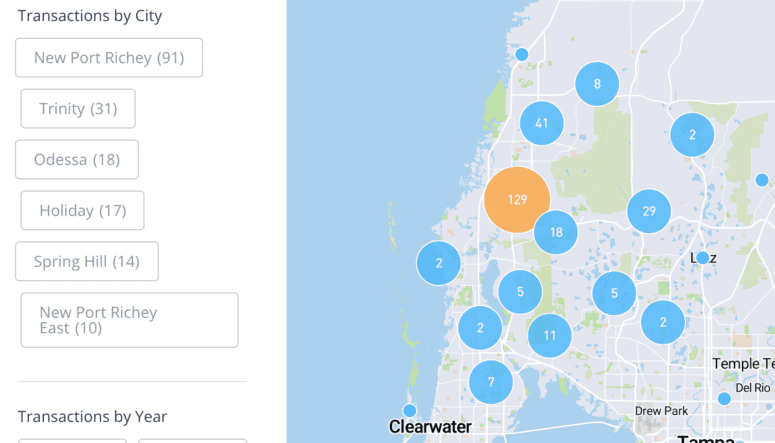How to Find the Best Realtor In My Area: Local Knowledge Matters!
- Published on
- 6 min read
-
 Matthew Stalcup Contributing AuthorClose
Matthew Stalcup Contributing AuthorClose Matthew Stalcup Contributing Author
Matthew Stalcup Contributing AuthorMatt is a Sacramento Valley native and current Portland, Oregon resident who is always happy to be writing. He holds a degree in English Literature and Technocultural Studies from the University of California, Davis, and is a recent inaugurate to the exciting world of real estate.
You’re ready to sell your home but aren’t sure who to hire as your agent. To find the best Realtor® or real estate agent in your area, first narrow your search to local candidates who have completed a high volume of sales in your city.
Real estate markets can vary drastically by location, even down to the neighborhood. Depending on where you’re located, buyers have widely different expectations and priorities for their prospective homes.
An agent who works in your specific area will have their finger on the pulse of local trends, empowering them to make informed, effective decisions about your sale.
Tyler LaBauve, a leading Baton Rouge, Louisiana, real estate agent who sells 15% more homes than average, tells us that a good rule of thumb is to make sure your agent’s office is nearby:
“Typically, no one’s going to drive an hour to an office every day to work in a market they aren’t living in. You should check to see if an agent is located in your area and that they’ve been working there for a number of years.”
Here are some of the best ways to check if your agent has adequate local experience.

Look for a high concentration of transactions in your area
In this case, the proof really is in the data. Confirm that they’ve sold numerous area properties. To get this information, you can simply ask an agent for their transaction history and go through the data yourself.
Or, you can browse the transaction heatmaps on HomeLight’s agent profile pages. These heatmaps show a graphical representation of agents’ home sales, giving you an immediate idea of where an agent has conducted the bulk of their sales.
Ask the agent about local buyer preferences
Knowing what local buyers want is critical to preparing your home for sale and marketing it once it’s listed. As such, your agent should know exactly what’s going to catch the eye of a typical area buyer.
When you call and interview an agent, ask questions to gauge how tuned-in they are to local buyer preferences. If the agent answers confidently and provides unique insight, you’ll know they’re on the level. Good questions to ask include:
- What renovations have the biggest impact in this market?
- How would you stage a home to cater to local trends?
- Who is buying homes in the area and why?
Gauge the agent’s knowledge of your area’s features
Things like commute patterns, local hot spots, and school districts can play a huge role in determining the value of your home. To ensure an agent knows why the location of your home is valuable, ask them about your neighborhood’s most attractive features and how they’ll affect your sale.

Review performance stats for a quality check
A truly excellent agent will have a proven history of success. As with local transaction history, you should ask any agent about these important data points:
Number of transactions
Great agents usually sell more homes than average. Not only does a high number of transactions mean that an agent has plenty of experience, it also means that they know what it takes to reliably conduct a successful home sale. To give you a frame of reference, the median number of sales for agents in 2020 was 10.
Years of experience
Markets change over time, and an agent who has been around long enough will have a better idea of how current market conditions relate to long-term trends. The median number of years of experience in real estate for agents is about 8 years.
Average days on market
The amount of time a home has been listed is referred to as “days on market,” and a major aspect of selling a home successfully is to do it quickly. If a home sits on the market for a while, buyers start to wonder why it hasn’t already sold and the final sale price can drop as a result. The National Association of Realtors reports that the median days on market in June 2021 was 30.
Percent of listings sold
Failing to sell a significant percentage of listings is a huge red flag. If an agent agrees to list a home, they should already have a plan to ensure the property sells within the listing agreement period. The best agents sell the vast majority of the homes they list and should have an explanation for why the remaining properties didn’t work out.
List price to sale ratio
LaBauve advises that one of the most important things to look for is an agent’s overall list price to sale ratio, or the difference between what their homes are listed for and what sellers actually end up making. A higher ratio means that the agent is able to convince buyers to stand by their initial price or even pay more for the property by starting a bidding war.
“The list price to sale ratio is a good way to find out an agent’s skill in negotiation,” shares LaBauve. “If the agent is able to sell a $200,000 home for 100% of its listing price instead of 98%, they’re netting the seller $4,000.”
NAR reports that the average home in 2020 sold for 99% of its asking price, and that 22% of agents reported reducing the asking price of a property at least once.

Note additional training relevant to your home sale
Every home sale is unique, and many real estate agents complete additional training in order to handle specific kinds of sales or simply excel as an agent. Many real estate agents take courses and receive a certificate that proves they’re qualified to meet the needs of specific clients. Here’s a rundown of some of the major certifications to look out for:
- Certified Residential Specialist (CRS): CRS agents are members of NAR (officially called Realtors®) who’ve completed between 25 to 150 transactions and have completed an additional 16 to 80 hours of education beyond what’s typically required of a Realtor®. They also adhere to a specific code of ethics dedicated to working in the best interest of their clients.
- Senior Real Estate Specialist (SRES): SRES Realtors® have knowledge and expertise to assist homeowners and buyers over the age of 50 through major financial and lifestyle transitions. They’re versed in differences in housing options for seniors, how to apply things like 401ks and pensions to real estate transactions, how to protect seniors from targeted scams, and more.
- Seller Representative Specialist (SRS): SRS certifications are issued by the Real Estate Business Institute and shows that an agent has advanced professional training essential to representing home sellers.
- Military Relocation Professional (MRP): MRPs are Realtors® who specialize in helping servicemembers sell and purchase homes. MRPs are highly versed in the issues that servicemembers face as the result of Permanent Change of Station (PCS) orders, VA home loans, and the many financial aid options available to veterans and active duty personnel.
- Green Designation: Green designated Realtors® receive ongoing education, resources, and tools to help them find, understand, and market properties with energy-efficient features.
- Luxury Homes Certification (LHC): LHC certification means an agent is trained to handle high-price real estate. These agents know how to price, negotiate, and market homes in the luxury market.
- Certified International Property Specialist (CIPS): A CIPS certification gives Realtors® the knowledge they need to successfully conduct property transactions that cross over international borders. They are up-to-date on international real estate regulations and are connected with an international network of agents.
Comb the web for client reviews
Think of reading an agent’s client reviews as checking their references. Ultimately, agents aim to serve their clients’ best interests, so the people agents have served should have positive opinions about their work. While there’s a chance that clients are leaving unfair reviews, an overview of an agent’s reviews over time can give you solid insight into their overall quality.
As you read through reviews, keep track of how many reviews an agent has received, as a higher number of reviews will give you a more well-rounded picture of their work. Also, keep in mind that recent reviews are more relevant and that extreme opinions are often biased. We advise looking through mid-range reviews and paying attention to what specific qualities reviewers praise.
Because leaving a review is as easy as posting online, there’s plenty of places to look for them, including:
Analyze the agent’s social media marketing strategies
A marketing plan can make or break an agent’s approach to a home sale and LaBauve stresses that sellers should check that their agent is prepared: “Your agent should have a marketing plan ready to go. They should be able to show the plan and explain how they’re going to implement it,” he suggests.
LaBauve also shares that social media marketing is the number one factor affecting the quality of an agent’s marketing strategy:
“In my opinion, the most important thing you should focus on is how knowledgeable they are with social media. If you look at the numbers, only around 7% of homes are sold because of a sign in the yard and, in my area, open houses, and print media account for less than 1% of sales. 44% are through major websites, about 33% through the Multiple Listing Service that all agents use, and the remainder is all social media. Social media is the one thing that an agent can actually really influence in order to make a difference.”
To find out how an agent plans to address social media marketing, ask what platforms they plan to advertise on and how they’ll target the most relevant demographics. Additionally, ask if they plan to set up a 3D tour of your home and how they’ll optimize photos for mobile, as around 77% of buyers find homes using a smartphone or other mobile device.

Overwhelmed? Let us do the work
All of the above are excellent ways to determine the quality of an agent, but separating the wheat from the chaff is definitely a chore.
To easily get in touch with agents who are proven to outperform the competition, use our agent matching platform. Simply plug in your information and we’ll crunch the numbers in order to match you with three top local real estate agents suited to handle your home sale. You’ll immediately gain access to the agents’ profiles, where you can find detailed information about their performance along with client reviews.
Header Image Source: (Gary Butterfield / Unsplash)
